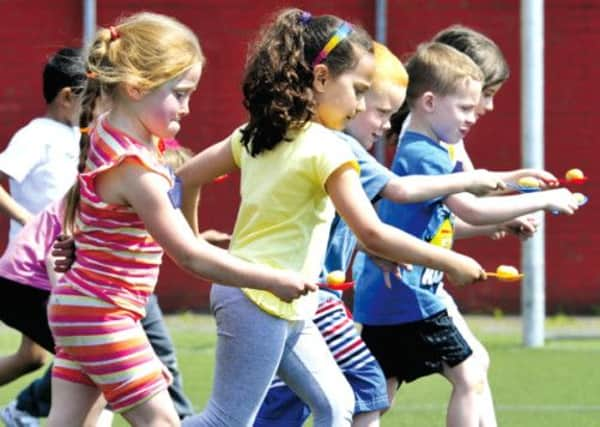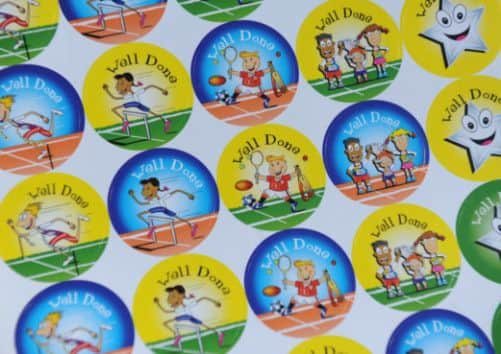Anna Burnside: Games without frontiers


MATTHEW Dempsey has just triumphed in the flat race. He is not a racehorse. He is an eight-year-old boy. To add to the confusion, he is wearing a Scotland football strip, is competing for India, and is a pupil at Ibrox Primary.
For those of us who recall sports day as a quick hop up and down a hastily whitewashed track, a choc ice and a huge feeling of relief that it’s all over for another year, welcome to the 21st century. Things are different here.
Advertisement
Hide AdAdvertisement
Hide AdSports days still have a competitive thrust. Successfully wiggle up the track (unmarked, today’s events are taking place on a football pitch which is hardly surprising given the school’s location opposite Rangers’ monolithic stadium) with a beanbag between your knees faster than anyone else and you get a ribbon. Fail to make it first, second or third and there is a sticker. (“Well done!”)


Added to this is a team element. Matthew’s triumph, for example, is noted down on a fiendish spreadsheet by supply teacher Sheelagh Boyce. She records his name, class and that he is running for India. Long after the beanbags are back in the cupboard, head teacher Cheryl McFadyen will take this paperwork home, collate the results and discover whether or not Pakistan has whomped Australia’s butt. It’s a major undertaking. The overall winners are not announced until June 21.
McFadyen is darting between the two ends of the wind-blown but gloriously sunny football training ground. (The primary ones, twos and threes are racing nearest the school, the fours to sevens at the far side.) She is wearing a smart silk frock that could do a turn at a summer wedding. “Careful boys,” she admonishes, as the Primary Sevens charge towards the table where Boyce and Matthew’s mum Pamela are dispensing ribbons and stickers. “You will knock these ladies into Asda.”
She thinks the current system is a good compromise, rewarding team effort as well as individual achievement. The old days, when one winner took the trophy and was crowned the champion, are not missed. “Some years,” she recalls, “I’ll look at the lists and think, well, this team is obviously going to win because they have several strong athletes. But it often doesn’t work like that. The team that wins is not always the one with the prime athletes. It’s the one with the good all-rounders.
Last year’s theme was the Olympics. This year, the teams have a Commonwealth Games theme. Fiona Macfarlane, the principal teacher supervising the finishing line and acting as steward for the Primary 4-7 events is, according to her large sticker, Clyde. Clyde is the games’ mascot, a grinning, anthropomorphic thistle.
It’s one of the many changes McFadyen has seen in her two decades of overseeing the egg and spoon race. “I have been here 21 years,” she admits. “Obviously I was a child when I started. “Before we were a health-promoting school, everyone who finished a race got a sweetie. Today it is not so competitive. Everybody is good at something. And it’s not just about speed.” She indicates the Primary Sixes looming towards the finishing line with beanbags jammed between their knees. “That takes tenacity and balance.”
The kids have just, as part of Health Week, had a chance to try many different team sports as well as smoothie-making and other cheery vegetable-based activities. Today, says the headteacher, “is just a good old fashioned sports day”. The pupils are even getting an ice lolly at half time. “It is,” she says in her best head teacher voice, “a very healthy ice lolly.” Has she been up since the small hours juicing carrots and freezing them in moulds? No she has not. “They are from Asda.”
These go down without touching the sides. It is, according to pupil support assistant Mary Gillespie, the sunniest sports day in living memory. She has been supervising the eating of lunch and playing of football in the playground for 12 years and can’t remember another year when sunblock was necessary. Fiona Macfarlane watches the egg and spooners (actually new potatoes on plastic spoons from the dining hall) and feels their pain. “They are not used to running about in the heat.”
Advertisement
Hide AdAdvertisement
Hide AdIbrox Primary has 180 children on its roll. They are, McFadyen estimates, from around 16 different countries, speaking the same number of languages. (Hence a sports day where children of, say, Pakistani origin, who have broad Glasgow accents, are giving their all for team Seychelles.) Many of the newer arrivals are from Eastern Europe. When asylum seekers were being dispersed to Glasgow, these were the kids who arrived at McFadyen’s door. There is a specialist language teacher, Sheilagh Corson, on the staff. She is visible at the other end of the starting line, beneath a parasol, sheltering from the sun.
With this lively demographic mix comes a bold mix and match approach to sportswear. Matthew, for example, opted for his Scotland strip. Several of the Primary Seven girls are dressed for the school disco. Footwear? Trainers, Converse and sparkly ballet pumps are all present and correct. There are recognisably athletic T-shirts – Nike, Puma – competing alongside Moshi Monsters, Atlantic Pirates, Dork and OMG. Muslim girls run in headscarves and a couple of Sikh lads are wearing patkas. Some of the boys are even wearing the official school polo shirt, complete with the badger logo, with regulation nylon shorts.
The kindly weather has brought parents and supporters to the sports ground, a council-owned facility normally used by Rangers as an overspill training pitch. Young mums in maxi-dresses push infants in ornate prams. One baby, just five weeks old, wears a pearl bracelet as she relaxes in her leopard-print chariot. Fathers whip off their tops and supervise toddlers from the horizontal, ray-soaking position. Two mothers in saris take their turn at holding the finishing line, which is made of bunting. Children too young to compete maraud around the pavilion and the centre of the Astroturf pitch. One small boy has to be rescued when he traps his foot in the netting of a goal post.
Waheed Iqbal is sitting on a wall. (No bleachers here, it’s back against the chain link fence or bring your own blanket.) His eight-year-old son, Zen, has clearly not expounded enough energy hopping, skipping and three-legged racing because he and two friends are playing a complicated chasing game that involves climbing around his father at high speed.
His own experience of sports day was very different to a quick sprint up a football pitch with a spud on a plastic spoon. “I went to school in Pakistan,” he recalls. “We had two weeks, all the city schools playing cricket and football matches together.” He looks around disapprovingly. “A lot of the parents of the older children are not here.” He has come with his wife, who is at the other end of the field watching their younger son competing with the wee ones. “Also, a lot of these children must be thirsty. They need a water cooler.”
There is some real talent on display. Three of the Primary Five boys have, between them, shared most of that class’s ribbons. One lad in particular is, according to Macfarlane, “a wee natural”. His mother might, she thinks, have been a member of the Spanish handball team. Her son has an instinctive grace and balance that is a delight to watch. Given a potato and a plastic spoon, he puts one hand behind his back, leans slightly forward and powers ahead. While others drop their spoons, watch their potatoes roll towards the finishing line without them and generally make a peching, lumpy hash of it, he is at the bunting without missing a beat.
“There are always tears and snotters,” says Macfarlane as she adjudicates between two large fellows, both claiming third equal in the ‘hopping’ race. (“Galloping,” observed Sheelagh Boyce in a low voice, “would be more like it”.) Macfarlane continues. “Dummies will be spat out every time. See doing first, second and third place? It’s too much pressure. I have a headache by 12 noon.”
Back among the little ones, the head teacher hardly has a minute to sit down and sip water from her crystal-studded bottle. “Can I go to the toilet?” asks one. Another approaches, tears welling up. “He is crying because he didn’t get a sticker.”
Advertisement
Hide AdAdvertisement
Hide AdA small girl approaches, brandishing an injured digit, pricked while pinning a winner’s ribbon onto her polo shirt. McFadyen is prepared. “I am the very woman,” she says, brandishing the first aid box. “I will give you a magic wipe, then chop off your thumb.” A look of horror starts at the corner of a tiny mouth.
“Joking.”
Suddenly, the mood changes. It is the last item on the programme, the “adult fun race”. Fathers who have been quietly filming their children on their phones jostle for starting positions, releasing the unmistakable smell of nylon sportswear on a summer’s day. And testosterone. Then they hit the bunting in a blur of charred, tattooed flesh and competitive spirit. They, too, get ribbons and stickers. “There’s a box of chocolates for you too,” Boyce informs the winner. “They are in the office so they don’t get melted.” Second place wanders off without collecting his prize. He is wearing navy blue football shorts and little else. A ribbon on a pin would not be much use to him.
Then the bell rings and everyone melts away like a choc ice from the olden days. McFadyen heads into the school carrying spoons and potatoes in an Asda bag. “Parents, staff, kids, everyone had a great day.” She beams. “That’s what it’s all about.” «
Twitter: @MsABurnside